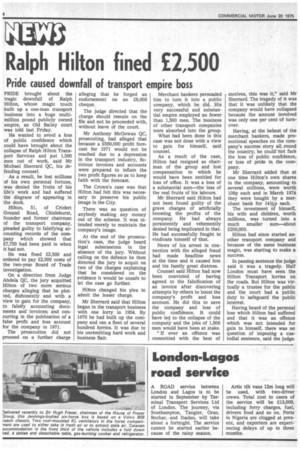Aj4 7 ,1
Page 6

If you've noticed an error in this article please click here to report it so we can fix it.
Ralph Hilton fined £2,500
Pride caused downfall of transport empire boss
PRIDE brought about the tragic downfall of Ralph Hilton, whose magic touch built up a one-man transport business into a huge multimillion pound publicly owned empire, an Old Bailey court was told last Friday.
He wanted to avoid a loss of public confidence which could have brought about the collapse of Ralph Hilton Transport Services and put 1,500 men out of work, said Mr Michael Sherrard QC, his defending counsel.
As a result, he lost millions of his own personal fortune, was denied the fruits of his life's work and had suffered the disgrace of appearing in the dock.
Hilton, 51, of Cricket Ground Road, Chislehurst, founder and former chairman of the transport company, pleaded guilty to falsifying accounting records of the company which showed that £7,750 had been paid in when it had not.
He was fined £2,500 and ordered to pay £2,500 costs of the two-year Board of Trade investigation.
On a direction from Judge Abdela QC, the jury acquitted Hilton of two more serious charges alleging that he plotted, dishonestly and with a view to gain for the company, to falsify accounting documents and invoices; and concurring in the publication of a false profit and loss account for the company in 1971.
The prosecution did not proceed on a further charge alleging that he forged an endorsement on an £8,000 cheque..
The judge directed that the charge should remain on the file and not be proceeded with, without leave of the court.
Mr Anthony McGowan QC, prosecuting, had alleged that because a £550,000 profit forecast for 1971 would not be reached due to a depression in the transport industry, ficticious invoices and accounts were prepared to inflate the two profit figures so as to keep faith with the forecast.
The Crown's case was that Hilton had felt this was necessary to preserve his public image in the City.
There was no question of anybody making any money out of the scheme. It was intended merely to maintain the company's image.
At the end of the prosecution's case, the judge heard legal submissions in the absence of the jury. Without calling on the defence he then directed the jury to acquit on two of the charges explaining that he considered on the evidence it would be unsafe to let the case go further.
Hilton changed his plea to admit the lesser charge.
Mr Sherrard said that Hilton began in the transport business with one lorry in 1954. By 1970 he had built up the company and ran a fleet of several hundred lorries. It was due to his unremitting hard work and business flair. Merchant bankers persuaded him to turn it into a public company, which he did. His very successful and substantial empire employed no fewer than 1,500 men. The business of other transport companies were absorbed into the group.
What had been done in this case was not done with a view to gain for himself, said counsel.
As a result of the case, Hilton had resigned as chairman of the group and lost compensation to which he would have been entitled for loss of office. It was a loss of a substantial sum—the loss of the real fruits of his labours.
Mr Sherrard said Hilton had not been found guilty of the grave charges of artificially boosting the profits of the company. He had always persistently and vehemently denied being implicated in that. He had successfully fought to vindicate himself of that.
News of his arrest in connection with the alleged fraud had made headline news at the time and it caused him and his family great distress, Counsel said Hilton had now been convicted of having agreed to the falsification of an invoice after discovering attempts by others to boost the company's profit and loss account. He did this to save the company and loss of public confidence. It could have led to the collapse of the company and the jobs of 1,500 men would have been at stake.
"If ever an offence was committed with the best of motives, this was it," said Mr Sherrard. The tragedy of it was that it was unlikely that the company would have collapsed because the amount involved was only one per cent of turnover.
Having, at the behest of the merchant bankers, made promotional speeches on the company's success story all round the country, he could not face the loss of public confidence, or loss of pride in the company.
Mr Sherrard added that at one time Hilton's own shares in the company, amounting to several millions, were worth 108p each and in March 1974 they were bought by a merchant bank for 14%p each.
The investment of himself, his wife and children, worth millions, was turned into a much smaller sum—about £200,000.
Hilton had since started another transport company and because of •the same business magic, was starting to make a success.
In passing sentence the judge said it was a tragedy. Half London must have seen the Hilton Transport lorries on the roads. But Hilton was virtually a trustee for the public and the court had a public duty to safeguard the public interest.
Having heard of the personal loss which Hilton had suffered and that it was an offence which was not intended for gain to himself, there was no question of imposing a custodial sentence, said the judge.




























































































































































